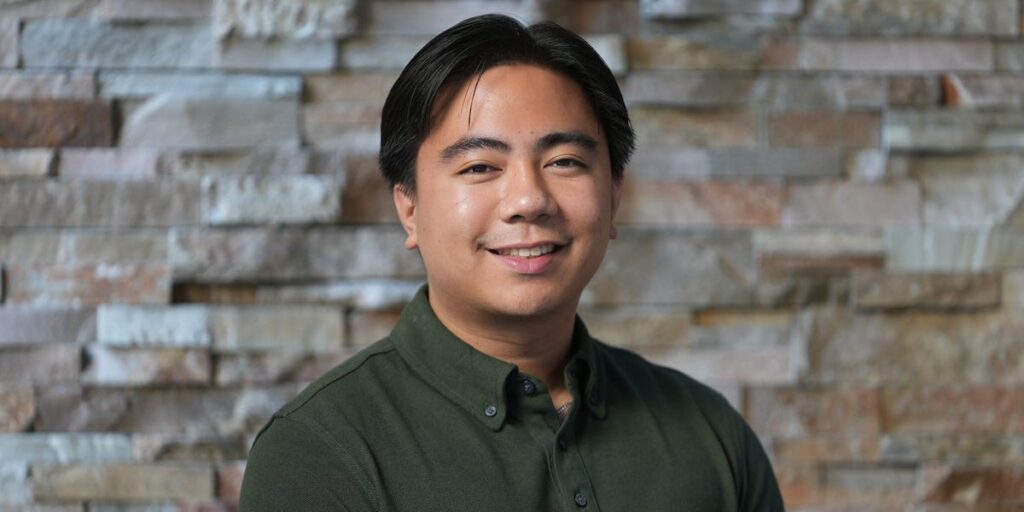Photo courtesy of Cody Apolinar
- Cody Apolinar, 24, landed a full-time DevOps analyst job after his tech internship.
- He acknowledges the Gen Z stare, and said he did the opposite to advance in his career.
- Apolinar said his curiosity has been the most crucial asset for career growth and opportunities.
This as-told-to essay is based on a conversation with Cody Apolinar, a 24-year-old DevOps analyst in Walnut, California. It has been edited for length and clarity.
I've been working as a DevOps analyst at AAA Auto Club Enterprises for about a year. Before that, I interned with the company for three months, then transitioned into a four-month part-time role while finishing my last semester at California State Polytechnic University, Pomona.
I studied computer science, but what helped me most in getting hired wasn't my degree; it was something I call my superpower: genuine curiosity. That trait helped me move quickly from intern to full-time employee, and it's what sets me apart from the stereotype of Gen Z's "stare."
You've probably seen the stare before. It's a blank expression, accompanied by silence. Now, it's become a meme, but I've witnessed it in real life, too.
My younger Gen Z peers have done the stare at work
In my previous job, I worked with many younger Gen Z coworkers at a fast-casual restaurant, and I noticed how often they would just stare. Especially with older customers, they didn't know how to respond. They weren't being rude necessarily; they simply lacked experience interacting face-to-face.
I think a mix of the pandemic and generational shifts created it. For me, the pandemic hit halfway through college. I already had years of in-person interaction under my belt. But I've noticed that even people just a couple of years younger than me seemed to interact differently.
My younger peers mainly lived online and only had to engage when spoken to. That disconnect carries over into the workplace and real life.
Soft skills are harder to grasp than technical ones
In my tech role, I recognized that technical skills can be learned. What might be more challenging to grasp is the skill of effective communication, which involves asking questions, offering genuine responses, and building meaningful relationships. This kind of connection leads to better learning, stronger mentorship, and more opportunities.
During my internship, I was one of around 25 people selected. Most of the interns were Gen Z college graduates with little to no work experience. Some of them only lasted the summer. A few fell into the "stare" category; they didn't speak up, ask for help, or engage much. That extra bit of curiosity they were lacking matters.
I've never considered myself the most intelligent person in the room, but I've always made an effort to ask: "Can you teach me this? How does this work? What else should I be learning?"
I was surprised to learn that not everyone does that. Many Gen-Zers do the bare minimum: complete assigned tasks and clock out. What helped me stand out was my drive to delve deeper and gain a deeper understanding.
Asking questions made me more aware of my potential
Initially, I planned to start applying elsewhere after graduation, but I was lucky. Just before my last semester ended, AAA offered me a full-time role. It felt like everything was aligning.
Now I'm working primarily in cloud infrastructure, even though that wasn't my original focus in college. I didn't know much about this area going in, but I've enjoyed learning new skills every day. If I hadn't been asking questions, I probably would've stayed stuck in my lane, unaware of my potential.
Speaking up and showing genuine interest matter
I've also had strong mentorship here, which has made an enormous difference. Not everyone gets that. That's where speaking up and showing genuine interest really matters.
If I could give any advice to other Gen Zers entering the workforce, it would be this: Take the time to learn about the people around you. Ask questions. Be curious — genuinely.
It might not sound like much, but it can make all the difference.
Do you have a story to share about a tactic that helped you advance in your career? Contact this editor, Manseen Logan, at [email protected].


